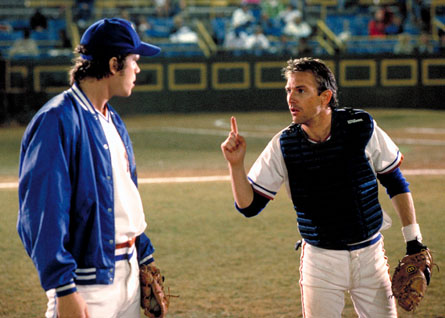Keep elected officials and journalists
that cover them honest. Call out these slippery lines and clichés.
 |
| "Write this down.....one game at a time." |
Bill Tieleman’s 24 Hours Vancouver/The Tyee column
Tuesday August 20, 2013
By Bill Tieleman
Crash
Davis: "You're
gonna have to learn your clichés. You're gonna have to study them, you're gonna
have to know them. They're your friends. Write this down: 'We gotta play it one
day at a time.'"
Ebby
Calvin LaLoosh:
"Got to play... it's pretty boring."
Crash
Davis: "'Course
it's boring, that's the point. Write it down."
- Bull Durham, 1988
Ever
heard awful, boring, clichéd words coming from the mouths of politicians and
journalists?
Of
course you have -- practically daily if you watch television news and political
panels!
Even
the revered Peter Mansbridge, veteran anchor of CBC's The National, will
regularly throw out one of the laziest questions in the media lexicon:
"What do you make of this?"
Well, I
make that it's a classic cliché that abdicates the interview entirely to the
person asked. But it's hardly the only terrible turn of phrase.
For
example, has any cabinet minister in recent memory "resigned" because
of their role in something gone wrong? No. Instead we hear weasel words like
this, after the BC Liberal ethnic outreach scandal earlier this year:
"When
mistakes occur, and they do, we must confront them and take responsibility for
them. I've talked to [John Yap], and he has agreed that he is going to step
aside from cabinet," Premier Christy Clark told media in March.
"Step
aside?" Is he square dancing? Will he step back inside shortly? No, Yap
resigned, but don't expect the truth to be told. Unless, of course, a
politician is desperately trying to sound sincere in interviews.
"To
tell you the truth" and "to be honest" or "to be
frank" are other classics -- because isn't the politician already supposed
to be telling the truth?
B.C.
Deputy Premier Rich Coleman is a master, getting two clichés into one short
sentence.
"I
think, quite frankly, the proponent here didn't do a great job of that, to be
honest with you," Coleman said in
2011 while referring to a proposed mine.
No
one is immune
Other
annoying pseudo-aphorisms include the catchphrase "but at the end of the
day," a signal that after blathering on for ages, a politician or
journalist is about to finally, mercifully come to some conclusion that often
contradicts what they've previously said.
No less
an admired columnist as Chantal Hébert is not immune to using a cliché as a journalistic
crutch. Writing on federal Conservative challenges in June, Hébert uncorked
this one in the Toronto Star.
"With
ongoing investigations into Senate spending, the upper house will almost
certainly continue to give the government more than its share of headaches
between now and the 2015 election," Hébert wrote.
"But
at the end of the day it is the abrupt loss of a chief of staff with a central
role in the operations of the government that falls in the potentially more
lethal category of political injuries," she concluded, cliché confirmed.
Of
course, if you are constantly concocting clichés there's only one thing to do
-- promise to end the practice "on a go forward basis"!
Otherwise, to
be honest, at the end of the day, you may have to step aside.
.





























1 comment:
My favourite political weasel phrase is "I can't answer that question, but what I can tell you is that...blah, blah, blah." Control the conversation by talking about what you want to talk about and don't answer questions you don't want to answer. Stay on message.
Post a Comment